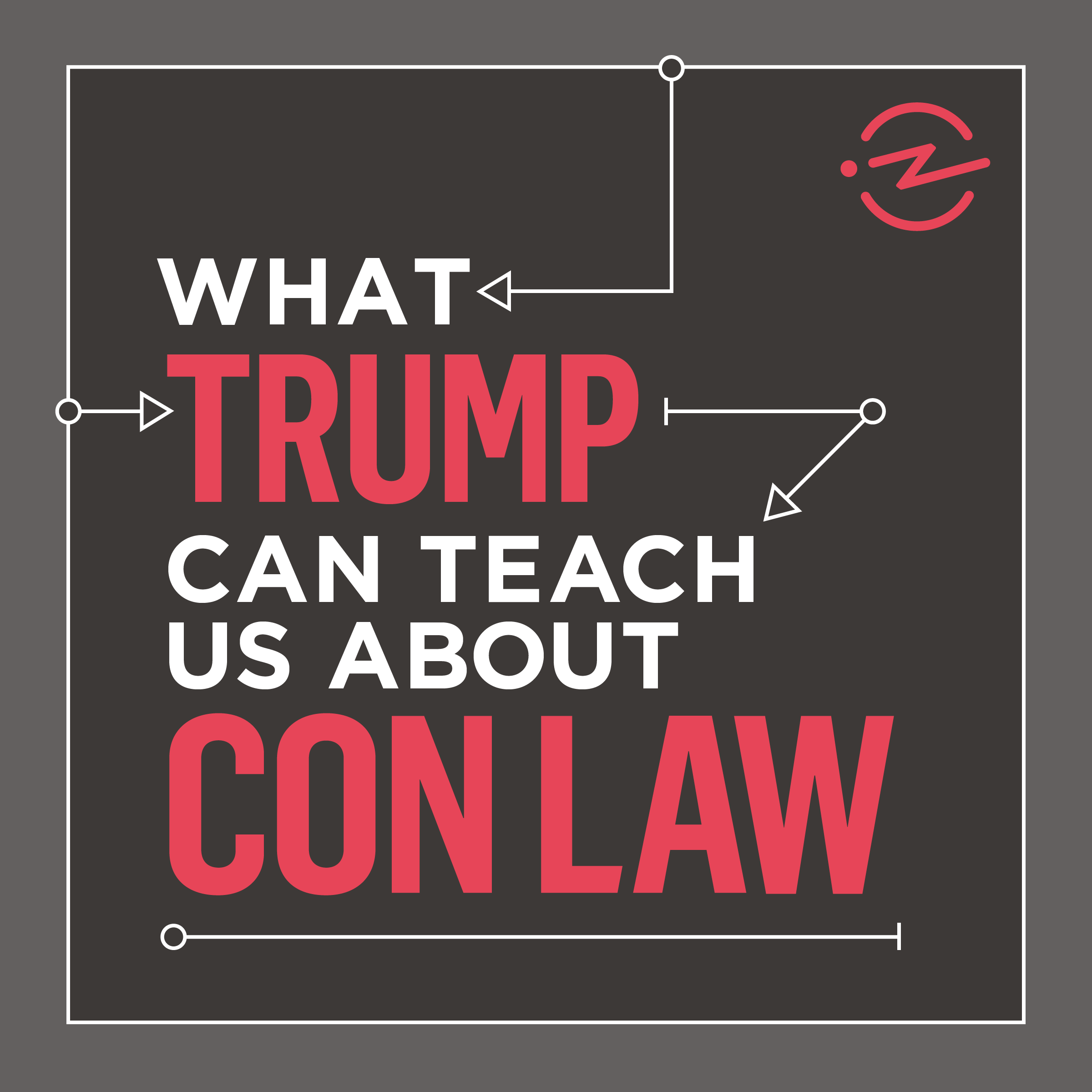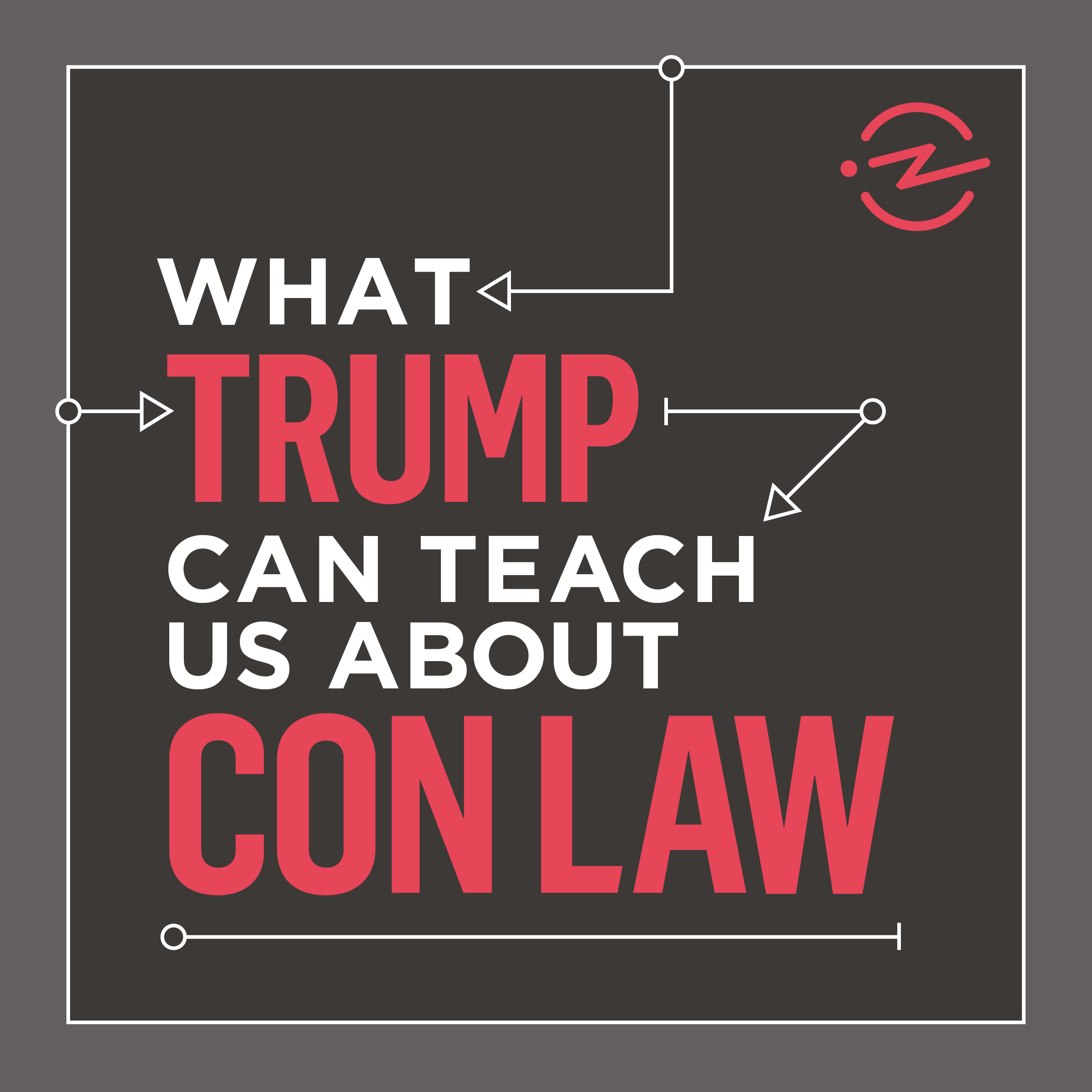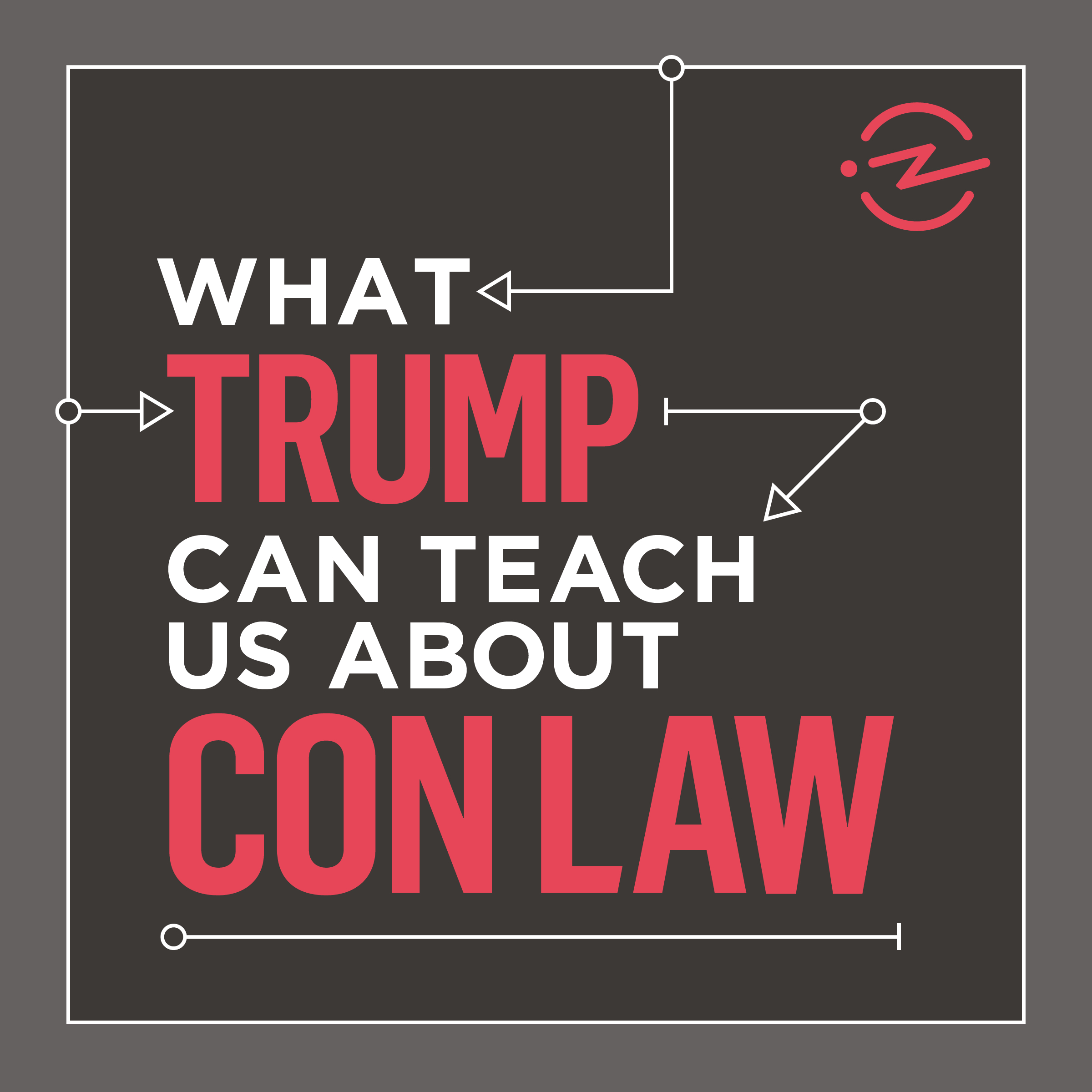What Trump Can Teach Us About Con Law
Professor Elizabeth Joh teaches Intro to Constitutional Law and most of the time this is a pretty straight forward job. But with Trump in office, everything has changed. Five minutes before class Professor Joh checks Twitter to find out what the 45th President has said and how it jibes with 200 years of the judicial branch interpreting and ruling on the Constitution. Hosted by acclaimed podcaster Roman Mars (99% Invisible, co-founder Radiotopia), this show is a weekly, fun, casual Con Law 101 class that uses the tumultuous and erratic activities of the executive branch under Trump to teach us all about the US Constitution. Proud member of Radiotopia from PRX.
On January 6th, a mob stormed the US Capitol to try to stop the certification of the presidential election results. Many of the insurrectionists will be tracked down and charged with crimes, in part, because their cell phone placed them in the Capitol Building during the attack. The case of Carpenter v. United States is the closest the Supreme Court has come to weighing in on the matter of historical cell phone data, but the decision didn’t not offer an opinion on law enforcement’s use of a location specific cell phone tower data dump without an individual suspect in mind. This brings up questions about the way warrants usually work under the Fourth Amendment.
Following the January 6th riot on Capitol Hill, the major social media platforms banned former President Donald Trump, and many accounts related to far-right conspiracy theories. In response, conservative activists have called for the repeal of Section 230 of the Communications Decency Act, saying it would prevent ‘censorship’ of right-wing viewpoints in the future. But what does Section 230 actually say? How are the social media companies determining what can be on their platforms?
On January 13th, former President Donald Trump became the first person ever to be impeached twice by the House of Representatives. But with Trump out of office, it’s unclear if there will be enough votes to reach the two-thirds majority needed to convict him in the Senate. With the trial looming, we look at whether Trump has a good argument against the charge he incited a riot on Capitol Hill, and whether or not it’s constitutional to impeach someone after they leave office.
How Trump is failing to overturn the election and how he might use his pardon power in his final days. This episode was recorded on December 21, 2020.
In late November, most states have certified the Presidential election for Joe Biden and his running mate, Kamala Harris. But Donald Trump continues to deny the results of the election and insist (without a shred evidence) that he lost because of voter fraud. What does the constitution have to say about the transfer of power? What if Donald Trump fails to concede? What does the constitution say about the period of time after an incumbent loses but remains in power?
During the 2000 Presidential Election, it wasn’t immediately certain who had won the electoral college votes in Florida, throwing the entire process into chaos. Eventually, the SCOTUS had to step in to rule on the outcome. With the 2020 election only a few days out, we take a look back at how the Supreme Court played a role in adjudicating the election in Bush v. Gore, and then we look forward to what might happen this time around.
On September 18th, Ruth Bader Ginsburg died at the age of 87. She was a trailblazing jurist who fought for the equality of women before the law. But her legacy is in peril, as Donald Trump and Senate Republicans prepare to nominate a conservative successor. What can Democrats do to alter the course of the SCOTUS? And what does the constitution tell us about so-called ‘judicial supremacy’?
With only two months before the election, the Republican Party got a lot of attention - and scorn - for using the White House as a backdrop during their nominating convention. The convention appeared to be in contradiction of The Hatch Act, which forbids federal employees from political campaigning while they’re on duty. Even if the convention broke the law, will anyone be held accountable? Plus, we tackle the President’s recent comments casting doubt on mail-in balloting.
We review some of the big cases that were decided during the SCOTUS term and assess the constitutionality of the federal policing of the Portland protests
As people around the world continue to protest police brutality, Republicans and Democrats in Congress have proposed bills that would reform policing across the U.S. But in the American system, states are given a lot of latitude over law enforcement, down to the use of tactics like chokeholds and tear gas. Given the constitution, what can the federal government actually do to make things better? Also, why was the ever-obscure Third Amendment trending last month?
The Supreme Court may not be able to meet in person, but they are still doing business over conference call. This month, they've considered three cases about Donald Trump's finances, and whether they should be released to Congressional committees and prosecutors in New York. What does history tell us about these cases which could have major consequences for executive power?
In mid-April, 2020, states are beginning to explore ways to re-open their economies amid the global coronavirus pandemic. But with states devising their own paths forward, many are wondering what powers the government has, even during a national emergency. Are the states violating our civil liberties by enforcing these lockdowns? To answer this question, many legal scholars are looking to a 115-year-old Supreme Court case for answers, Jacobson v. Massachusetts.
During a health crisis, what is the government allowed to do? As the novel coronavirus spreads across America, there have been closures and lockdowns across the country. In this episode, we look to history to understand who has the power to quarantine, and how the office of the president can be used to slow down a pandemic.
Prosecutors recommended that Roger Stone, an associate of Donald Trump, be given a heavy penalty after being convicted of seven felony counts, including lying to authorities. But after intervention from Attorney General Barr, and tweets from the President, those recommendations were rescinded. What can his case tell us about presidential interference and prosecutorial discretion?
After Donald Trump ordered the killing of Iranian general Qasem Soleimani, many wondered if the two countries were on the brink of a major conflict. This incident is only the latest in the long-standing fight between Congress and the President over who has the power to make war, and if an act of violence against another state can be legitimate without Congressional approval.
This episode also includes an update on the Senate impeachment trial of Donald Trump, which began earlier this week.
Make your mark. Donate at http://radiotopia.fm
Bribery is one of the three offenses listed in the Constitution as grounds for impeachment. Even though that is attempting to bribe Ukraine is the act that precipitated to Trump’s impeachment, it’s not explicitly listed in the articles of impeachment. Why is that?
Make your mark. Go to radiotopia.fm to donate today.
Since the beginning of the impeachment proceedings against the President, Donald Trump has insisted he has a right to confront “the whistleblower,” the anonymous member of the intelligence community who set the whole thing in motion. There is a Confrontation Clause in the Sixth Amendment of the United States Constitution, which says a defendant in a criminal case has the right to face their accuser. But does this clause apply to the impeachment hearing against a president in Congress?
Donald Trump says he should not be impeached as President, since there was ‘no quid pro quo’ on a phone call where he asked the Ukrainian president to investigate a political rival, former Vice President Joe Biden. But does quid pro quo need to be explicitly stated to be a legal issue? And can private citizens like Rudy Giuliani represent America on foreign policy issues?
Trump lawyers assert that all of Trump’s actions during the Mueller investigation were within his rights as President and can’t be classified as obstruction of justice, especially because there is no underlying crime alleged. But as Martha Stewart will tell you, that’s not how obstruction of justice works.
What is Congress’ contempt power and how can they use it to force people to cooperate with their investigations?
It's likely that Trump will invoke executive privilege during the numerous investigations and inquiries into his actions. Presidents have insisted they need to keep secrets to do their job effectively since Washington, but the term "executive privilege" is relatively recent and it has rarely been tested in court.
What does the 25th Amendment say about presidential fitness, disability, and Trump?
Trump has threatened to revoke Birthright Citizenship with an executive order. This proposed order contradicts the Fourteenth Amendment, but Trump’s tweets contend otherwise.
Some of the Constitutional considerations of the Kavanaugh confirmation process. Recorded October 2, 2018.
When Trump tweets just the single word “Treason?”, probably in reference to the anonymous New York Times Op-Ed, is he using that word correctly? What does our federal Constitution say about treason? And when exactly does someone commit a treasonous act?
Trump has a second Supreme Court pick and that has a lot of people wondering about the future of Roe v. Wade. Here we look at the constitutional basis of the decision and the strange personal history of Roe.
Justice Kennedy decided to retire at the end of this Supreme Court term. Kennedy has been the swing vote on a lot of important cases. He’s mostly considered a conservative, but he has voted with the more progressive judges on cases having to do with gay rights and abortion. His successor will be appointed by Trump and that has many progressives concerned that the replacement will be even more conservative.
Trump has said the taking the fifth makes "you look guilty as hell" but lot of Trump's associates are now taking the fifth in the Russia investigation. How should we interpret people taking the fifth?
Can Trump block people on Twitter? It turns out, the First Amendment has something to say about that.
The Posse Comitatus Act limits the federal government’s ability to use the military to enforce domestic policy within the United States. However, this act has so many allowable exceptions, it has rarely been officially violated. When Trump suggests “The Feds” should police Chicago to get the murder rate down, he might have found the perfect example of a Posse Comitatus Act violation.
When the office of Trump’s personal lawyer, Michael Cohen, was raided by the FBI, Trump took twitter to express his concern. He wrote “Attorney-client privilege is dead!” Let’s see if it is.
The Fourth Amendment includes the right to be secure from “unreasonable searches and seizure.” We have some idea of how this applies to cops, but if teachers are allowed to carry guns in school, are they also subject to the Fourth Amendment?
The Russia investigation has been called a "witch hunt" by Trump and his supporters on Twitter. And they've invoked the legal concept "the fruit of the poisonous tree" to invalidate the investigation. What does the Fourth Amendment say about tainted investigations and does it apply to Trump?
The Tenth Amendment limits the federal government’s control over the states, but the interpretation of that limit is always shifting.
The Fourth Amendment says that “The right of the people to be secure in their person, houses, papers, and effects, against unreasonable searches, shall not be violated, and no Warrants shall issue, but upon probable cause, supported by Oath or affirmation, and particularly describing the place to be searched, and the persons or things to be seized.” But at the border, warrantless searches are OK, even when it comes to our digital devices. With Trump's focus on the border, this is becoming a bigger deal.
Trump likes to threaten the press with libel lawsuits. What does the Constitution have to say about defamation and the press?
You might not remember December 22, 2017 as a particularly notable day, but I will always remember it as the day the world first saw Donald Trump’s redesigned Presidential Challenge Coin. Because 99% Invisible did an episode about challenge coins and we actually offered our own coin to donors, my association with challenge coins is strong. Because of that, I was forwarded the December 22 Washington Post article about Trump’s garishly over the top challenge coin by about...9000 people. Here’s a story about challenge coins and my reaction to the Trump coin.
Two Vice Presidents have been indicted with criminal charges while serving in office, but does the Constitution allow the prosecution of a President? Elizabeth Joh and Roman Mars explore this question.
Presidents don't usually weigh in on criminal cases. In fact, it’s critical to the integrity of the criminal justice system that the executive not try to influence the outcome of cases. But Trump can't help himself. President Trump has called the US criminal justice system “a joke.”
From "taking a knee" to refusing to salute the flag, the US has a rich history of public dissent, a right guaranteed by the Constitution. But you’d be surprised to learn that the Supreme Court has taken drastically different stands on this right, and now that Trump has tweeted his opposition to certain public displays of dissent, it’s a good time to explore the history of this principle of the First Amendment.
What does the Constitution say about the president’s ability to wage war and what is the role of Congress?
Impeachment is talked about a lot, but it is extremely rare. Impeachment is the constitutional emergency measure written into the constitution itself. We talk about the procedure impeachment and why it's so hard.
The federal government can't pass any law it wants to. It's limited by Article 1 Section 8 of the Constitution, but the executive branch can choose how to enforce those laws. Under Trump, there are indications that drug laws, which are based on the Commerce Clause, are about to be enforced very differently.
To build a wall, Trump is going to need to seize private land. The Constitution has something to say about that and it’s known as the Takings Clause.
The Constitution says that the president can appoint important executive positions with the advice and consent of the Senate. But what if the Senate is out on recess? Does the president have to wait until the Senate comes back? Today we’ll explore the recess appointment power.
The Constitution says that a “person holding any office of profit or trust” cannot accept gifts from any foreign state. In Article II, it also says the president specifically cannot accept gifts from “United States, or any of them.” If Trump businesses profit from a foreign or domestic state, is that a violation of either one of the emolument clauses? It’s hard to say, because there is literally no case law when it comes the emoluments clause. None!
There have already been a few high profile lawsuits against President Trump and the first defense against such a lawsuit is to claim that the president cannot be sued in civil court. But it turns out, the Supreme Court has ruled different ways on whether or not the president is immune from lawsuits. We look a three cases from history and hear how they’re being used to argue for and against the current cases filed against Trump.
In an executive order, Trump threatened to withhold federal money from any place acting as a “sanctuary city.” Supreme Court rulings over the 20th century have ruled in different ways on how federal money can be used to influence the behavior of local governments. When it comes to the Spending Clause, how coercive is too coercive?
There are reports that the Trump administration is being investigated for obstruction of justice. This has led a lot of people to wonder if the Constitution’s presidential pardon power could be used to absolve members of his administration, or even himself, from criminal charges. And what does the Constitution say about how a pardon has to be presented? Can Trump pardon someone with a tweet?
The US Constitution has a clause that describes how the president can hire certain political appointees with the advice and consent of the Senate. It doesn’t say when the president can fire someone. We take a look at recent Trump firings and put them in context of Supreme Court cases where the court both upheld and denied the president’s right to fire an executive branch employee. Even if a president has the constitutional power to fire someone, it doesn’t mean there aren’t political and legal consequences of the action.
Back in February 2017, Trump tweeted a criticism of the “so-called judge” who blocked the enforcement of his travel ban. Why does the president have to listen to what the courts say? We’re going to tell the story of a key moment in history when the president (Truman, in this case) and the court strongly disagreed.
Welcome to “What Trump Can Teach Us About Con Law"! Every week Roman Mars (99% Invisible) will host a fun, casual Con Law 101 class that uses the tumultuous and erratic activities of the executive branch under Trump to teach us all about the US Constitution.





















































